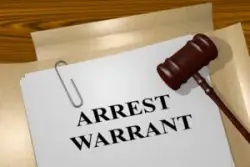
Getting arrested is something everyone wants to avoid, but what happens
if something you do gets you in enough trouble to get you arrested? Even
worse, what happens if you don’t realize that there was a warrant
for your arrest? If one has been issued, you could be arrested anywhere,
whether you’re at home, at work, or even at a routine traffic stop.
It’s vital for you to deal with this issue before too long in order
to avoid increased punishment.
Is There A Warrant For Your Arrest?
- The first step in this process is to determine whether or not there is
in fact a warrant out for your arrest.
How to Check a Warrant for Arrest:
- Many county websites keep up to date information and offer online warrant
searches. In case they don’t offer that service, contact your local
sheriff or police department for that information. - You can also call any court clerk in the state you believe the warrant
may be in. States maintain a warrant database that can be accessed from
any state court. Rather than identifying yourself when making the phone
call, just ask, “Is three an outstanding warrant for –
your name here – in a civil or criminal case?” If you can, have your case
number, birth date, and social security number ready.
What Are The Details Of The Warrant?
- If there is in fact a warrant out for your arrest, it’s time to learn
the details of it. First thing you need to do is to find out when the
warrant was issued. Depending on how long it’s been since it was
issued, fines may have been accumulating, or it may no longer be valid.
If fines have been accumulating, you’ll want to settle the matter
immediately to prevent further penalties. If the warrant was issued for
an incident that happened over two years ago, you’ll want to look
up the charge to see if there’s a time limit on the warrant’s validity. - The next thing you’ll want to do is learn exactly what you’re
being charged with in order to best prepare your response. Key information
includes the details of the charge, the date of the offense, and the case
type. Depending on the charge, you could avoid being arrested by paying
a fine, and the type of case can help you determine what kind of legal
representation you want to hire. - The last thing you’ll want to do before moving on to the next step
is to note the bail amount. If you’re worried about jail time, having
a set dollar amount could help you raise the money necessary to avoid
jail time while you wait for your trial.
What Now?
Before you do or say anything that could get you in more trouble, you’ll
want to contact a criminal defense attorney. Koffel Brininger Nesbitt is one
of Ohio’s leading privately retained criminal law firms, and our
criminal defense lawyers are prepared to fight for you in court. Contact us today
through our website, or give us a call at (614) 884-1100.
Related Posts:
Call or text 614-884-1100 or complete a Free Case Evaluation form

